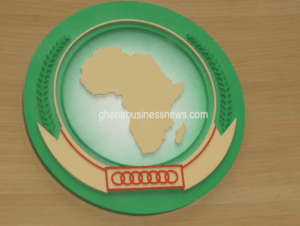Israeli official removed from AU Summit
 An Israel government official attending the African Union (AU) Summit in the Ethiopian capital, Addis Ababa has been removed from the main conference hall.
An Israel government official attending the African Union (AU) Summit in the Ethiopian capital, Addis Ababa has been removed from the main conference hall.
According to news reports seen by Ghana Business News, Israel’s Deputy Director for Africa at the Foreign Ministry and other members of delegation were expelled from the hall Saturday during the opening of the Summit. They were said to have no accreditation to the Summit.
A video circulating online shows AU security staff removing the official, Sharon Bar-li and her delegation from the Hall.
According to the reports AU officials say the only Israel government official accredited to attend the Summit is Israel’s Ambassador to the AU, Aleli Admasu, and the invitation is ‘not transferable’.
Israel has swiftly reacted, blaming Algeria and South Africa.
תקרית דיפלומטית חמורה: חברי משלחת ישראל גורשו מאולם ועידת האיחוד האפריקני | צפו@BarakRavid pic.twitter.com/uNiffXhugf
— וואלה! (@WallaNews) February 18, 2023
The reports cited a spokesman for the Israeli foreign ministry describing the incident as “severe” and blaming Algeria and South Africa to be behind the act.
A South African official, Vincent Magwenya told the AFP that the Israelis must substantiate their claim.
When the AU granted Israel observer status in 2021, it stirred an uproar. Powerful member states, notably South Africa and Algeria, which argued that it flew in the face of AU statements supporting the Palestinians protested the decision by Moussa Faki Mahamat, AU Commission Chairman. The Palestinians also protested the decision urging its withdrawal.
At the 36th Ordinary Session February 18, 2023 the President of the Union of Comoros, Azali Assoumani was elected Chairperson, taking over from Macky Sall of Senegal.
In his remarks, Chairman of the AUC, Moussa Faki siad the 36th AU Summit is taking place at a time when the international context is marked by worrying uncertainties, fueled by geopolitical conflicts, fragmented economic governance, with unforeseeable consequences for Africa.
“Over the past three years, global economic growth has lost momentum and inflation is rising higher rates…. Faced with such a situation, it is imperative that our Member States decide, with determination, in their economic and development choices. The activation of various mechanisms of internal resilience, intra-African solidarity, rapid implementation of African financial institutions, all supported by virtuous governance seems in my view to be the way to salvation,” he said.
He emphasised on the need for Pan-Africanism of the Member States and urged them to avoid “the paradigm in which we see, arms folded, the house of the neighbour burned…This paradigm is a form of collective resignation of conscience that has nothing to do with our culture and even less with our civilization, both of which are based on mutual aid. The shocking example of these realities is given today by the countries confronted with terrorism, which fight, often alone in general indifference. …
Where is our Pan-Africanism? Where is our solidarity? Where is our brotherhood…?” He queried.
Faki expressed regrets with the recent resurgence of unconstitutional changes of government, accentuating political instability and the weakening of States. These, he said, have led to violent extremism, terrorism, the inherent conflict in electoral processes, inter-community conflicts and climate change.
He was however, satisfied with the progress made to “Silencing the Guns” on the continent over the decade as the Union has invested itself fully in the resolution and mitigation of several crises.
By Emmanuel K Dogbevi
